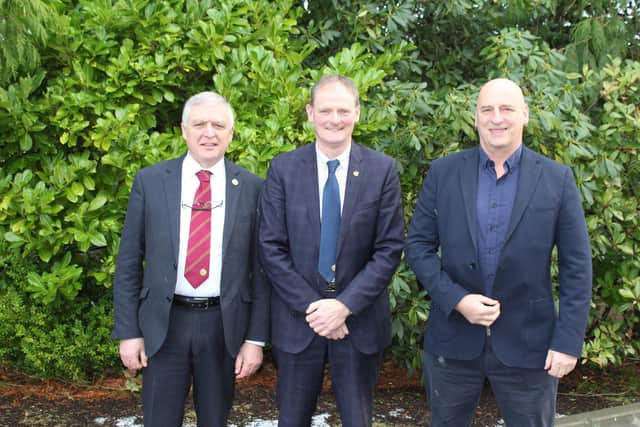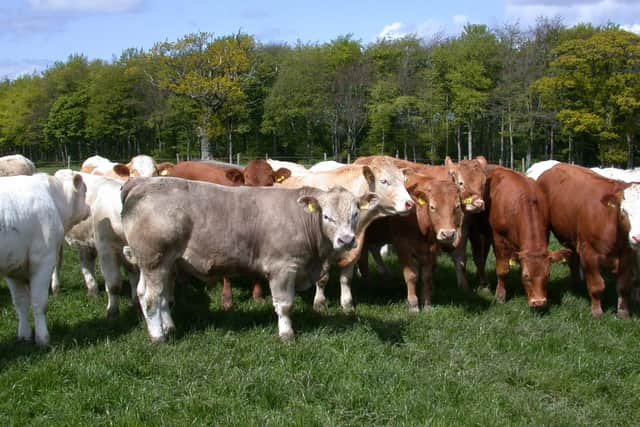UFU presidential meetings 2024: what were the key issues discussed?
and live on Freeview channel 276
The events represent a traditional starting point to the New Year for the UFU. They also provide rank and file members of the organisation with an opportunity to air their views and directly engage the team of people charged with the responsibility of seeking policy change, whether this be in Belfast, London or further afield.
The UFU’s top team comprises the president, David Brown, plus his two deputy presidents: William Irvine and John McLenaghan.


Advertisement
Advertisement
This year’s presidential meetings took place against a backdrop of growing environmental pressures impacting across the farming sector; challenging farmgate prices and envisaged changes to the support measures available to local agriculture.
Ata fundamental level the Union remains committed to policies that recognise the balancing of environmental priorities with the need to recognise the delivery of both food security and sustainable farm incomes into the future.
Farm development programmes
The UFU is claiming that all farm development programmes could come to a halt in Northern Ireland.


This is a direct consequence of new ‘ammonia’ related measures, specified by the Northern Ireland Environment Agency (NIEA).
Advertisement
Advertisement
According to David Brown, the new measure will relate to both new developments and the replacement of existing sheds.
At the heart of the matter, is the recent assertion by NIEA that farm building work is, essentially, prohibited if the site in question is within7km of an area of outstanding scientific interest.
According to DavId Brown, the new recommendation takes in 97% of the land farmed in Northern Ireland.
He further explained:
“The measure will drastically stymie investment across all the farming sectors.
“An industry must be allowed to invest in its future.”
Advertisement
Advertisement
The Union presidential team believes the NIEA the impact of the new ammonia measure must be confronted. But it could take the decision of a future Stormont Executive minister to make this happen.
The decision to move away from the ‘Ammonia Standing Advice’ that was previously in place, follows a legal challenge by the Northern Ireland’s Office of Environmental Protection.
As a result, NIEA will now provide planning authorities with case and site-specific advice, on a case-by-case basis. This will be implemented with immediate effect until a new ammonia strategy and updated standing advice have been agreed and are in place.
David Brown again:
"It needs to be recognised that farm development is extremely expensive and is a huge financial commitment. From planning fees and the various reports that are needed to satisfy NIEA to the actual building itself is very costly.
Advertisement
Advertisement
For many farm families in Northern Ireland, the cost of planning is simply unaffordable and now this sudden policy change has the potential to create more hindrance for farmers by pausing much needed advances on-farm again, stopping some that are currently in the system or putting farmers off the idea completely.
“Our members are frustrated and angry about the constantly moving goalposts.”
He concluded:
"In this latest planning development, NIEA does not seem to recognise that to help improve farms' environmental footprint regarding greenhouse gas emissions, ammonia or water quality issues, investment in farm infrastructure and replacing older facilities is vital.
“Yet, planning permission continues to be a major stumbling block for farmers, preventing them from doing more to improve the environment.
Advertisement
Advertisement
“We are in dire need of planning policy that supports our farmers and their ambitions to become more sustainable, helping us to achieve extremely challenging climate change targets and address other environmental issues.
Flood compensation
The UFU is confirming that a business case linked to the proposed flood compensation measures for farmers in Northern Ireland will not been acted upon by Department of Agriculture, Environment and Rural Affairs (DAERA).
According to John McLenaghan, a draft measure was developed by DAERA policy division.
He added:
“This was then presented to economists with the department. But that’s a far as it got.
Advertisement
Advertisement
“They could not justify the expenditure involved at this stage. Our plan now is to make the case for compensation to a future farm minister at Stormont.
“On that basis, I would strongly urge all affected potato and vegetable producers to keep a clear and concise record of the losses they incurred, following last autumn’s floods.”
There are precedents for such a course of action to be taken.
During the Covid pandemic Northern Ireland’s then farm minister, Edwin Poots introduced a support measure for farmers who produce potatoes specifically for the catering sectors
Advertisement
Advertisement
Prior to Christmas Northern Ireland’s Secretary of State, Chris Heaton-Harris MP, announced a £15M flood compensation measure.
The vast bulk lf this money will go to business and home owners in the towns of Newry, Downpatrick, Lurgan and Portadown.
Meanwhile, the UFU is making it clear that processers and retailers must fully recognise the challenges facing those farmers and growers directly impacted by the floods.
William Irvine explained:
“It may not be physically possible for some growers to meet previously agreed supply contracts. This is a direct result of last autumn’s atrocious weather.
Advertisement
Advertisement
“Processers and retailers must be very mindful of this reality.”
He continued:
“There is also a need for growers to receive realistic prices for the produce they can supply at the present time.
“It is in the long terms interests of processers and retailers to maintain their farmer-supply base.
“Flood-affected farmers must be allowed to trade on a sustainable basis over the coming weeks and months.”
Advertisement
Advertisement
Irvine is mindful that large numbers of vegetable and potato growers have left the fresh produce sector in places like North Down over recent years.
He explained:
“This is because of the extreme price pressure that has been placed upon them.
“Consumers in Northern Ireland want locally produced food. But they wont get this if farmers are forced out of business.
“This is a core reality that fresh processers and fresh produce retailers fail to recognise this reality.
Sustainable farmgate prices
Advertisement
Advertisement
The Ulster Farmers’ Union (UFU) presidential team has confirmed that securing sustainable farm gate prices will be a priority for the organisation throughout 2024 and beyond.
This approach reflects the probability of farm support budgets falling in real terms over the coming years.
The Union hierarchy is also pushing to have food security levels within the UK boosted.
David Brown, commented:
The potential and importance of UK farming and food production is substantial going forward.”
Advertisement
Advertisement
The UFU’s president believes the role of agriculture to be critical to tackling two of the biggest challenges that we face at a national and global level: producing enough food to feed a growing population while also tackling climate change.
David Brown added:
“It is disappointing that only 27 percent in the UK recognise locally produced food as being important, but there are huge gains to be made through collaboration and engagement with the agri-food industry, government and academics.
“Farmers are extremely vulnerable to elements that are out of their control such as extreme weather events, geopolitical tensions, changes to policy and production costs.
“However, ensuring the marketplace is a level playing field for our farmers and creating polices that enhance food production and environmental incentives that support family farms to remain viable, will support our members to invest in the future of farming.”
Advertisement
Advertisement
The Union president confirmed the need to have Northern Ireland’s current £300M farm support budget increased for the future.
Simply maintaining current budget represents a reduction in ites real term value.
David Brown again:
“The ethos behind our new agricultural policy is to help farmers to reduce emissions further, while supporting local food production and farm profitability.
“Change is often challenging and yet, as we look forward, we can reflect that change has been a constant in the agricultural sector.”
Advertisement
Advertisement
The year ahead will see the agri-food sector in Northern Ireland seeking to address the sustainability challenge.
The UFU president concluded:
“Our role has been to ensure that those who would advocate to shrink our food production, are aware of the many initiatives being undertaken by our farmers.
“Northern Ireland is setting a high global standard as the first region to establish an extensive baseline of all farms on soil nutrients, alongside a sustainable ruminant genetics programme to improve the efficiency of our livestock.
“Carbon surveys, required by both government and those we supply, will provide the crucial evidence that our production systems are amongst the most efficient in the world.”
Weight restrictions on public roads
Advertisement
Advertisement
The UFU is seeking changes to the gross weight thresholds for tractor and equipment combinations allowed on Northern Ireland’s roads.
The maximum figure is currently set at 31t.
According to John McLenaghan, this restricts farmers and contractors to hauling slurry tankers with a maximum capacity of 3,000g.
Under current UK legislation, the maximum weight of a laden tractor and trailer on the road is 31t.
The maximum laden weight of a conventional unbalanced trailer in this combination is 18.29t, even if the manufacturer's plates state that they can carry more.
Advertisement
Advertisement
McLaughlin is very mindful that the 2024 slurry spreading season gets underway in Northern Ireland at the beginning of February.
Adding to concerns is the fact that many machinery manufacturers can offer slurry tankers with capacities well in excess of 3,000g.
This brings the issue concerning the legalities of farmers and contractors hauling slurry tankers on public roads centre stage. Insurance-related issues would also be a factor.
The Union’s deputy president points to potential actions that might be taken Police Service of Northern Ireland (PSNI) officers as another issue that must be addressed, where these matters are concerned.
Advertisement
Advertisement
Given this background, the UFU will be seeking an official review of the gross weight thresholds allowed for tractor and equipment combinations, where their road usage is concerned.
He explained:
“It is not right to restrict the use of new technologies within any industry. Where tractors and agricultural equipment are concerned, safety standards have improved dramatically over recent years.
“This is particularly so, where breaking systems are concerned.”
The UFU is also questioning the current legal age limits, where the driving of tractors in tandem with trailers, tankers and other items of equipment are concerned.
John McLenaghan again:
“Sixteen year-olds are currently allowed to drive on country roads. But the age limit rises to seventeen, once tractors enter a 30mph limit.”